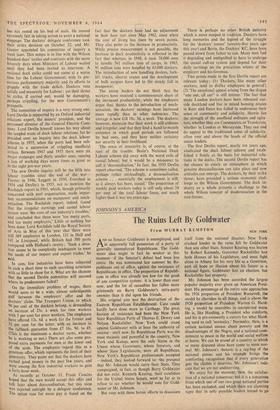JOHNSON'S AMERICA
The Ruins Left By Goldwater
From MURRAY KEMPTON
NEW YORE
NO so Senator Goldwater is unemployed, and
in apparently full possession of a party of generally unemployed Republicans. The Gold- water idea might in fact be weaker at this moment—if the Senator's defeat had been less entire. He was nominated last summer by Re- publicans out of office, against the resistance of Republicans in office. The proportion of Republi- cans in office was already too low for the good of any competitive system: it is lower than ever now, and the list of casualties has fallen more grievously on Barry Goldwater's intra-party enemies than it did upon his friends.
His original aim was the destruction of the Eastern Republican Establishment. Cato could hardly have done more to Carthage. The great bastion of resistance had been the New York State Republican Party of Thomas E. Dewey and Nelson Rockefeller. New. York could stand against Goldwater with at least the authority of success--until now. Its Republican Party was the most majestic and powerful in the country, New York and Kansas were the only States in the Union whose Governors, whose Senators, and whose State Legislatures, were all Republican. New York's Republican professionals accepted -- indeed, they looked forward to—the prospect that Mr. Johnson would carry their State. They campaigned, in fact, as though Barry Goldwater did not exist. Kenneth Keating, their candidate for the United States Senate, went so far as to refuse to say whether he would vote for Gold- water or Mr. Johnson.
But even with these heroic efforts to dissociate itself from the national disaster, New York crashed louder in the ruins left by Goldwater than any other State. Senator Keating was beaten by Robert Kennedy, Governor Rockefeller lost both Houses of his Legislature, and must fight alone in Albany for his very life as a Governor, past all hope or illusion about his future as a national figure. Goklwater lost an election, but Rockefeller lost property.
Mr. Johnson has been accorded the largest popular majority ever given an American Presi- dent. His percentage of the entire vote approaches the 1936 proportion of President Roosevelt, the model he cherishes in all things, and is above the 1920 proportion of President Warren G. Hard- ing, a model he resembles in unexpected ways. He is, like Harding, a President who comforts, and his is pre-eminently a victory for what Hard- ing used to call 'normalcy.' Normalcy, then, is a certain national unease about poverty and the disadvantages of the Negro, and a national com- mitment to peace in the world and social welfare at home. We can be proud of a country to which so many disputed ideas have come to seem nor- mal. Mr. Johnson's rhetoric is a rag-bag of the national pieties and his triumph brings the comforting recognition that if every generation gets the cliches it deserves. Mr. Johnson's indi- cate that we are not undeserving.
We enjoy for the moment, then, the satisfac- tion of a national consensus; but it is a consensus from which one of our two great national parties has been excluded, and which there are alarming signs that its only possible leaders intend to go A
































 Previous page
Previous page